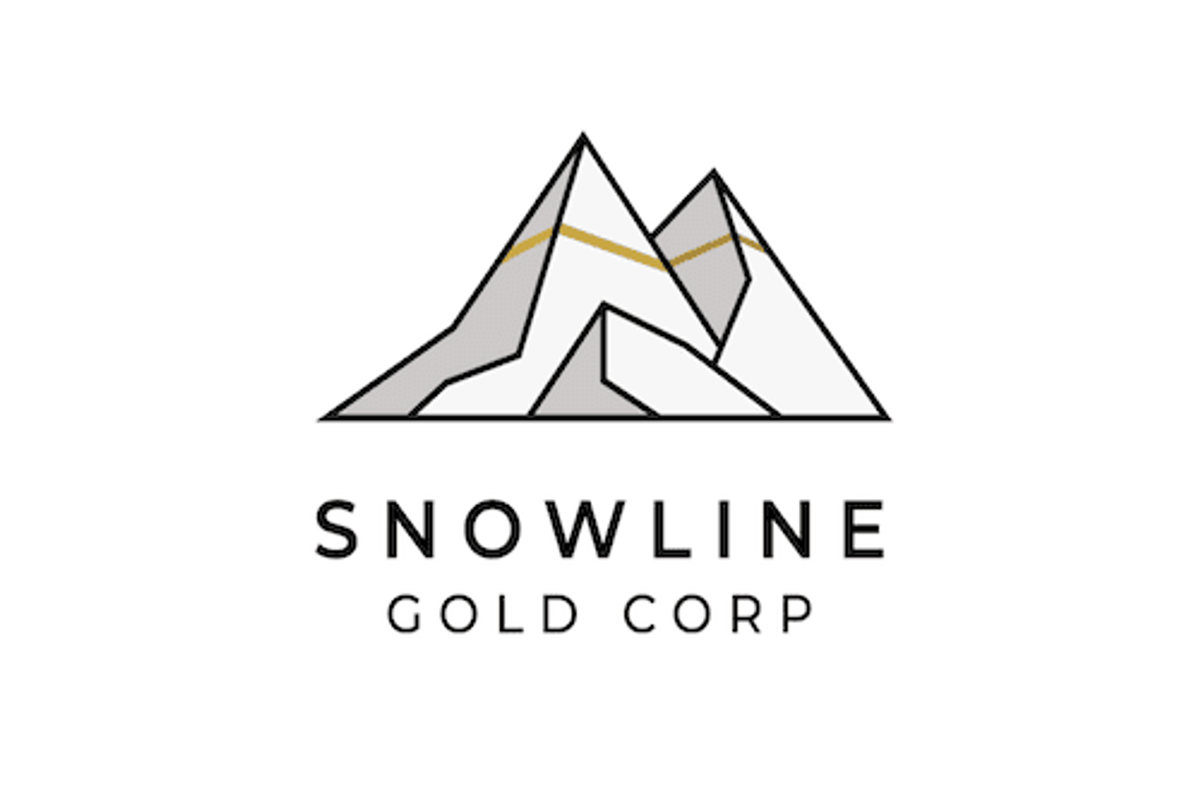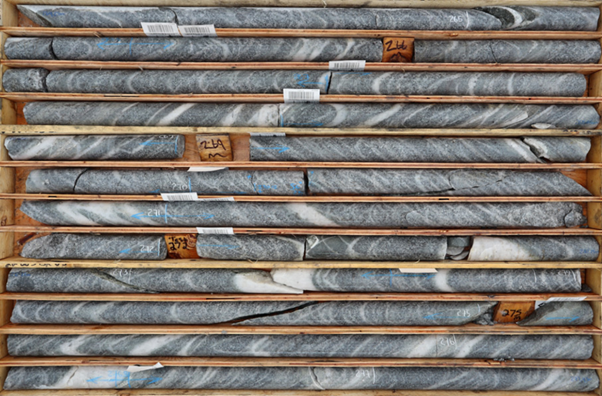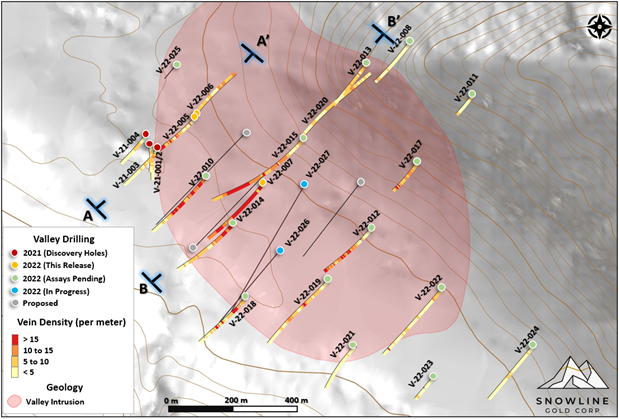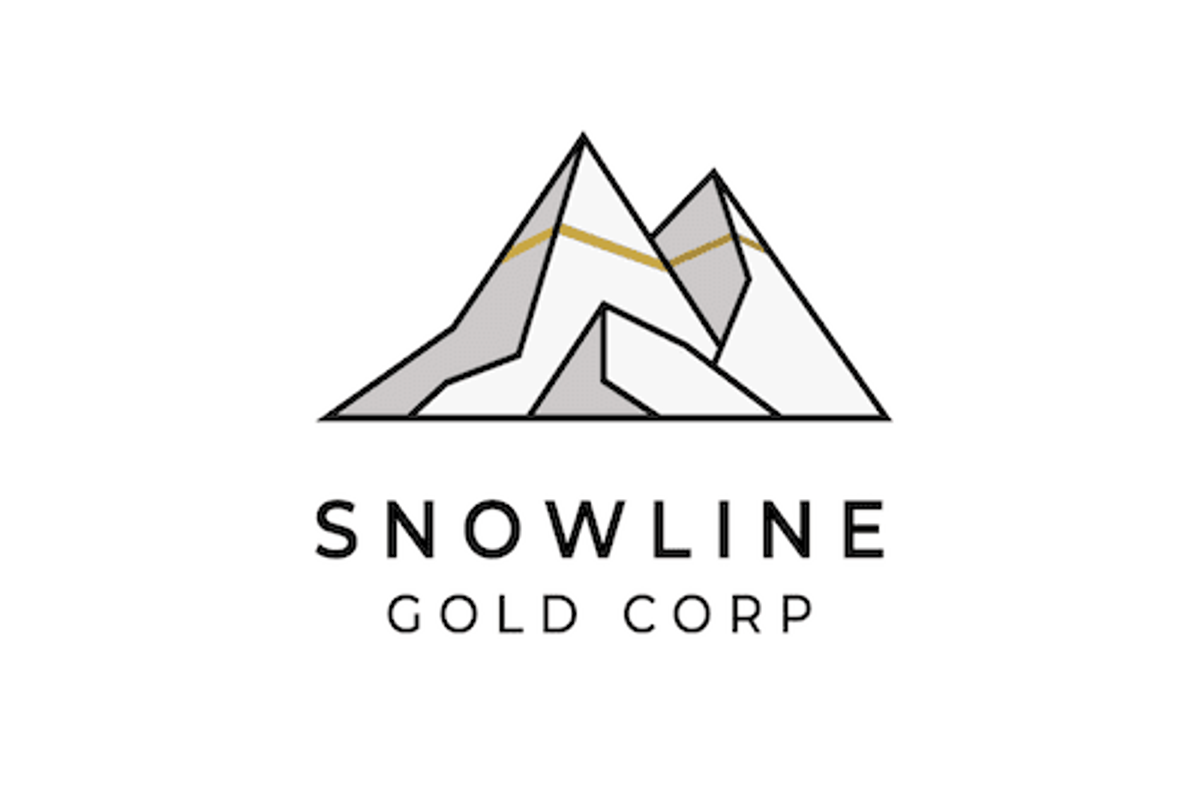
- The top of drill hole V-22-007 returned 2.30 g/t Au over 282.9 m from bedrock surface, including 3.24 g/t Au over 146.0 m from 56.0 m downhole
- Assays for bottom 127.1 m of drill hole V-22-007 still pending
- Hole V-22-005 returned 1.52 g/t Au over 192.0 m from 132 m downhole, within a broad interval of 1.03 g/t Au over 331.3 m from bedrock surface to end of hole
- First-ever drilling commenced at Gracie Zone, with visible gold observed in G-22-001
- Drilling ongoing at both targets, assays pending for majority of program.
SNOWLINE GOLD CORP. (CSE:SGD) (OTCQB:SNWGF) (the "Company" or "Snowline") is pleased to announce to announce initial, preliminary[1] assay results from its 2022 drilling program at the Valley Zone, Rogue Project, Yukon, and to provide a general exploration update. Holes V-22-005 and V-22-007 each intersected broad zones of mineralization averaging >1.5 gt Au over significant widths. V-22-007 averaged 2.30 gt Au over 282.9 m from bedrock surface to 288.0 m depth, with assays still pending past that point for the bottom 127.1 m (31% of the total hole

Table 1 -Preliminary highlight intervals from the Valley Zone. Holes V-22-005 and V-22-007 both intersected a broad central corridor of abundant sheeted quartz veins cutting through the Valley intrusion. *Interval widths reported; true widths of the system are not yet known and may be gradational. **Only the top 282.91 m of V-22-007 have been received to date; assays for the bottom 127.1 m of the hole still pending.
"Our initial assay results demonstrate increasing scale and fertility in the Valley Zone," said Scott Berdahl, CEO & Director of Snowline. "In an aggressive step back 154 m to test the width of the system with Hole V-22-005 and an aggressive step out 340 m along the length of the system with V-22-007 we've encountered grades and intervals greater than those of our discovery holes last season. These high grades are associated with unusually high quartz vein densities that are present across a large area. The presence of consistent grades from near surface is also encouraging as it improves the potential economics of the prospect. The Valley discovery is a work in progress-we eagerly await the remainder of results for V-22-007 and for many other holes from this year's ongoing drill campaign."

Figure 1 - Cross section showing V-22-007 assay results in the context of vein densities in surrounding holes. Vein densities similar to those seen in V-22-007 are also observed near surface in V-22-014 and at depth in V-22-015. View looks northwest along the strike of the system. The surface trace of the B to B' cross section shown can be seen in Figure 5.
HOLE V-22-007
Hole V-22-007 was collared in the Valley intrusion and remained in the intrusion for its entire length. Moderate to strong (>15 veins/metre) quartz vein intensities occur regularly throughout the hole.
Gold grades within V-22-007 exhibit a high degree of consistency. 168 of 232 samples-representing 204.85 m (non-contiguous) or 72.4% of the 282.9 m length of the interval returned to date-assayed higher than 1.0 g/t Au. Conversely only five samples-representing 6.5 m (again, non-contiguous) or 2.3% of the length of the hole returned to date-assayed below 0.2 g/t Au, with the lowest assay for the hole returning 0.152 g/t Au over 0.5 m. When capped at 10 g/t Au, the interval received to date (282.91 m) drops by just 0.05 g/t Au from an average of 2.30 g/t Au to 2.25 g/t Au (Table 2).
Only partial results from hole V-22-007 have been received at this time. For expediency in processing, the top 282.9 m of the hole were shipped when ready on an available supply flight, independently of the bottom 127.1 m. Results for the remainder of the hole will be released when available.

Figure 2 - Quartz vein mineralization in V-22-007, from 133.5 m to 159.9 m downhole, as shown previously in the Company's June 30, 2022 news release. This interval returned an average of 3.17 g/t Au, within a broader interval averaging 3.24 g/t Au over 146.0 m from 56.0 m to 202.0 m downhole.
HOLES V-22-005 AND V-22-006
Holes V-22-005 and V-22-006 were drilled along section with 2021 discovery hole V-22-003 (1.25 g/t Au over 168.7 m from bedrock surface - see Snowline news release dated February 10, 2022) to test the local width of the mineralized quartz vein system.

Figure 3 - Cross section showing V-22-005 and V-22-006 assay results in the context of surrounding holes. The view looks northwest along the strike of the system, with the width of the system open to the northeast and open to depth. The surface trace of the A to A' cross section can be seen in Figure 5.
Hole V-22-005 was collared in the Valley intrusion as a 154 m step back from V-21-003 to test width of the system. The hole averaged 1.03 g/t Au across its entire 331.30 m length, including 191.95 m averaging 1.52 g/t Au from 132.0 m downhole. As with V-22-007, capping of assays at 10 g/t Au only diminishes overall grade by 0.05 g/t Au (Table 2), demonstrating the widespread and relatively consistent nature of gold mineralization.
Hole V-22-006 was collared at the same site as V-22-005 and drilled to the northeast as a further test of the width of the system. The hole encountered sheeted quartz vein mineralization in diorite, averaging 0.23 g/t over its entire 301.0 m length with broadly consistent grades and mineralization to the end of the hole.

Figure 4 - Quartz vein mineralization in V-22-005, from 264.3 m to 277.4 m downhole, as shown previously in the Company's June 30, 2022 news release. This interval returned an average of 1.09 g/t Au, within a broader interval averaging 1.52 g/t Au over 192.0 m from 132.0 m to 324.0 m downhole.

Table 2 - Summary of all 2022 drill hole assay results received to date. Holes V-22-005 and V-22-006 are mineralized along their entire lengths, and V-22-007 carries anomalous grades along the entire 282.91 m interval received to date. Several zones of higher grades are present, but capping these at 10 g/t Au shows that the intervals are carried by robust mineralization along their lengths. *Interval widths reported; true widths of the system are not yet known and may be gradational. **Only the top 282.91 m of V-22-007 have been received to date; assays for the bottom 127.1 m of the hole still pending.


Figure 5 - Drilling progress at the Valley Zone, showing vein densities (top) and instances of visible gold (bottom). Instances of trace visible gold in quartz veins have been identified along roughly 1000 m of strike length to date, between holes V-21-004 and V-22-022.
VALLEY DRILLING UPDATE
Two drills are active at Valley, with 6,750 m drilled on the target so far this season for 7,554 m total drilled on the target to date. Drilling to the southeast of previous holes has extended the known strike length of the mineralization to >1 km, with lower vein densities to the extreme southeast. Hole V-22-024 was drilled roughly 1.3 km southeast of V-21-004 to test a magnetic low thought to be a potential southeastern extension of the Valley. Dioritic dikes up to 26.2 m drilled width (true width unknown) were encountered in drill core, but the hole was primarily hornfels and sediment, with light quartz veining.
GRACIE ZONE DRILLING
Initial drilling has also commenced at the nearby Gracie Zone, with sparse quartz-bismuthinite veins and 3 instances of trace visible gold encountered in G-22-001, the first-ever drill hole into the target.

Figure 6 - Initial holes at Gracie, showing the locations and vein densities in the context of surface geochemistry. G-22-001 intersected silicification and mostly light to locally moderate quartz veining, with 3 instances of visible gold. G-22-002 intersected fractured sedimentary rocks with light veining and was discontinued at 165 m. Assays for both holes are pending, and drilling at Gracie is ongoing.
The hole, drilled to a total depth of 380.16 m, intersected a deformed and hornfelsed sedimentary succession. The rocks intersected in the hole predominantly exhibit biotitic and sericitic alteration with moderate silicification and minor carbonatization. Disseminated to semi-massive pyrrhotite, pyrite and chalcopyrite are associated with alteration and quartz-carbonate-sulphide veins, up to 2 cm in width, that comprise pyrrhotite, pyrite, chalcopyrite and bismuthinite with visible gold hosted in the veins at 62.9 m, 265.8 m and 275.5 m. Locally, vein densities are up to 5 veins/metre, though more typical is 0.5-1 vein/metre over the length of the hole. Assays for this hole are pending,
ABOUT ROGUE
The geological setting and style of mineralization at Rogue's Valley Zone indicate the presence of a bulk tonnage gold target, with similarities to Kinross's Fort Knox Mine in Alaska and Victoria Gold's Eagle Mine in the Yukon. Gold is associated with bismuthinite and telluride minerals hosted in sheeted quartz vein arrays along the margins of a mid-Cretaceous aged Mayo-series intrusion. The Rogue Project hosts multiple intrusions of similar age and affinity to that at Valley along with widespread gold anomalism in stream sediment, soil and rock samples. The project is thus considered by the Company to have district-scale prospectivity for reduced-intrusion related gold systems.
Valley is an early-stage exploration project without a resource estimate, and the presence or absence of an economically viable orebody cannot be determined until significant additional work is completed.
QA/QC
On receipt from the drill site, Valley's NQ-sized drill core was systematically logged for geological attributes, photographed and sampled at Snowline's 2022 field camp. Sample lengths as small as 0.5 m were used to isolate features of interest, otherwise a default 1.5 m downhole sample length was used. Core was cut in half lengthwise along a pre-determined line, with one half (same half, consistently) collected for analysis and one half stored as a record. Standard reference materials, blanks and duplicate samples were inserted by Snowline personnel at regular intervals into the sample stream. Bagged samples were sealed with security tags to ensure integrity during transport. They were delivered by expeditor and by Snowline personnel to ALS Laboratories' preparatory facility in Whitehorse, Yukon, with analyses completed in Vancouver.
ALS is accredited to ISO 17025:2005 UKAS ref 4028 for its laboratory analysis. Samples were crushed by ALS to >70% passing below 2 mm and split using a riffle splitter. 250 g splits were pulverized to >85% passing below 75 microns. A four-acid digest with an inductively coupled plasma mass spectroscopy (ICP-MS) finish was used for 48-element analysis on 0.25 g sample pulps (ALS code: ME-MS61L). All samples were analysed for gold content by fire assay with an atomic absorption spectroscopy (AAS) finish on 30 g samples (ALS code: Au-AA23). Any sample returning >10 g/t Au was reanalysed by fire assay with a gravimetric finish on a 30 g sample (ALS code: Au-GRA21).
Samples with visible gold and other samples returning >2.0 g/t Au by fire assay, along with a set of randomly selected samples, will undergo further processing, analysing the screen rejects to determine whether the screening process could introduce a sampling bias in current results by excluding coarse gold from analysis, resulting in an under-reporting of true grades. Other biases are also possible.
| Hole ID | QA/QC Type | Failed by | Over/Under | Comment | Action |
| V-22-005 | Reference (Low Au) | 0.003 | 0.3% | Fail: High | Rerun Requested |
| V-22-005 | Reference (Low Au) | 0.002 | 0.2% | Fail: High | Rerun Requested |
| V-22-006 | Reference (Low Au) | 0.069 | 8.0% | Fail: High | Rerun Requested |
| V-22-007 | Reference (High Au) | -0.08 | -1.1% | Fail: Low | Rerun Requested |
| V-22-007 | Reference (High Au) | -0.03 | -0.4% | Fail: Low | Rerun Requested |
| V-22-007 | Blank | 0.001 | 10.0% | Fail: High | Rerun Requested |
| V-22-007 | Blank | 0.009 | 90.0% | Fail: High | Rerun Requested |
Table 3 - QA/QC failures from assay results received to date. 7 of 74 QA/QC samples returned values outside of 2 standard deviations from an expected concentration (or, in the case of blanks, above detection limit). Most errors are small, and overall they do not appear to reflect a systematic problem with the assays. Affected sample batches will be re-run to ensure a high standard of data quality.
As noted, results reported herein are considered preliminary following receipt of a low percentage of abnormal assays from standard and blank samples inserted by the Company into the Valley sample stream. (Standard samples are prepared by a third-party laboratory to have known quantities of gold, and blank samples are known to contain very limited concentrations of gold.) In total, 7 of 74 reference samples fell outside of acceptable limits. Two standards failed with low values underreporting gold, while four failed with high values overreporting. Reanalysis of samples run along with these reference materials will provide greater certainty in the final assay numbers. These results will be reported if a material difference is identified between the current assays and the re-run sample batches. Based on the widespread and consistent mineralization throughout all three holes reported herein, however, the Company does not believe that the re-analysis of this relatively small number of samples will have a significant impact on the preliminary mineralized intervals reported herein.
WARRANT EXERCISES
During the months of July and August 2022 (to date), 5,033,018 warrants were exercised, for gross proceeds to the company of $2,611,205.75.
ABOUT Snowline Gold Corp.
Snowline Gold Corp. is a Yukon Territory focused gold exploration company with a seven-project portfolio covering >127,000 ha. The Company is exploring its flagship >85,000 ha Einarson and Rogue gold projects in the highly prospective yet underexplored Selwyn Basin. Snowline's project portfolio sits within the prolific Tintina Gold Province, host to multiple million-ounce-plus gold mines and deposits including Kinross' Fort Knox mine, Newmont's Coffee deposit, and Victoria Gold's Eagle Mine. The Company's first-mover land position and extensive database provide a unique opportunity for investors to be part of multiple discoveries and the creation of a new gold district.

Figure 7 - Project location map for Snowline Gold's eastern Selwyn Basin properties. The Valley and Gracie Zones on the Rogue are the sites of current drilling.
[1] These results are considered preliminary as 7 out of 74 of the Company's QA/QC insertions of blanks and standard reference materials into holes V-22-005 through 007 returned values of outside of acceptable limits. This is not an unusual nor necessarily unexpected failure rate. In response, five samples on either side of failed insertions will be reanalysed along with the insertions themselves. Given the scale and general consistency of the gold mineralization across the holes where insertions did pass QA/QC screening, the Company deems these preliminary results to be strongly indicative of overall grade and thus material information. Final assay results may be updated in a future release. For more information, see the QA/QC section of this release.
QUALIFIED PERSON
Information in this release has been prepared under supervision of and approved by Thomas K. Branson, M.Sc., P. Geo., Exploration Manager for Snowline and a Qualified Person for the purposes of National Instrument 43-101.
ON BEHALF OF THE BOARD
Scott Berdahl
CEO & Director
For further information, please contact:
Snowline Gold Corp.
+1 778 650 5485
info@snowlinegold.com
CAUTIONARY NOTE REGARDING FORWARD-LOOKING STATEMENTS
This news release contains certain forward-looking statements, including statements about the Company's upcoming drill program, implied significance of visual inspection of drill core, outcomes of mineral tenure ownership resolution, and surface work and plans for exploring and expanding a new greenfield, district-scale gold system. Wherever possible, words such as "may", "will", "should", "could", "expect", "plan", "intend", "anticipate", "believe", "estimate", "predict" or "potential" or the negative or other variations of these words, or similar words or phrases, have been used to identify these forward-looking statements. These statements reflect management's current beliefs and are based on information currently available to management as at the date hereof.
Forward-looking statements involve significant risk, uncertainties and assumptions. Many factors could cause actual results, performance or achievements to differ materially from the results discussed or implied in the forward-looking statements. Such factors include, among other things: risks related to uncertainties inherent in drill results and the estimation of mineral resources; and risks associated with executing the Company's plans and intentions. These factors should be considered carefully, and readers should not place undue reliance on the forward-looking statements. Although the forward-looking statements contained in this news release are based upon what management believes to be reasonable assumptions, the Company cannot assure readers that actual results will be consistent with these forward-looking statements. These forward-looking statements are made as of the date of this news release, and the Company assumes no obligation to update or revise them to reflect new events or circumstances, except as required by law.
SOURCE: Snowline Gold Corp.
View source version on accesswire.com:
https://www.accesswire.com/713312/Snowline-Gold-Intersects-23-Grams-Per-Tonne-Gold-Over-2829-Metres-at-Its-Valley-Zone-and-Commences-Drilling-at-Gracie-Rogue-Project-Yukon
